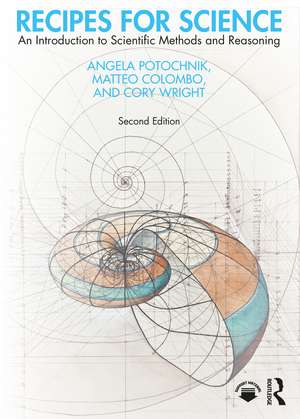Recipes for Science: An Introduction to Scientific Methods and Reasoning
Autor Angela Potochnik, Matteo Colombo, Cory Wrighten Limba Engleză Paperback – 22 apr 2024
Special features of Recipes for Science include contemporary and historical case studies from many fields of physical, life, and social sciences; visual aids to clarify and illustrate ideas; text boxes to explore related topics; plenty of exercises to support student recall and application of concepts; suggestions for further readings at the end of each chapter; a glossary with helpful definitions of key terms; and a companion website with course syllabi, internet resources, PowerPoint presentations, lecture notes, additional exercises, and original short videos on key topics.
Key Updates to the Second Edition
- 13 short chapters of uniform length that make it easier to adapt to a college semester
- Case studies and examples featuring new research and important historical research across many fields of science
- Added discussion of timely topics, including large research collaborations, trust and distrust of science, machine learning and other technology-driven advances, diversity in science, and connections to indigenous knowledge
- Streamlined and simplified discussion of some topics, such as experimentation and statistical hypothesis-testing
- Exercises that are clearly aligned with learning goals and sorted into types: Recall, Apply, and Think
- Additional online exercises and a series of original videos on key topics
- Exercise solutions available on an instructor-only section of the website
| Toate formatele și edițiile | Preț | Express |
|---|---|---|
| Paperback (2) | 333.98 lei 3-5 săpt. | +22.52 lei 4-10 zile |
| Taylor & Francis – 22 apr 2024 | 333.98 lei 3-5 săpt. | +22.52 lei 4-10 zile |
| Taylor & Francis – 27 aug 2018 | 432.63 lei 6-8 săpt. | |
| Hardback (2) | 764.20 lei 6-8 săpt. | |
| Taylor & Francis – 7 sep 2018 | 764.20 lei 6-8 săpt. | |
| Taylor & Francis – 22 apr 2024 | 994.23 lei 6-8 săpt. |
Preț: 333.98 lei
Nou
Puncte Express: 501
Preț estimativ în valută:
63.92€ • 66.48$ • 52.77£
63.92€ • 66.48$ • 52.77£
Carte disponibilă
Livrare economică 24 martie-07 aprilie
Livrare express 07-13 martie pentru 32.51 lei
Preluare comenzi: 021 569.72.76
Specificații
ISBN-13: 9781032290966
ISBN-10: 103229096X
Pagini: 378
Ilustrații: 62 Line drawings, black and white; 21 Halftones, black and white; 83 Illustrations, black and white
Dimensiuni: 174 x 246 x 20 mm
Greutate: 0.45 kg
Ediția:2 ed
Editura: Taylor & Francis
Colecția Routledge
Locul publicării:Oxford, United Kingdom
ISBN-10: 103229096X
Pagini: 378
Ilustrații: 62 Line drawings, black and white; 21 Halftones, black and white; 83 Illustrations, black and white
Dimensiuni: 174 x 246 x 20 mm
Greutate: 0.45 kg
Ediția:2 ed
Editura: Taylor & Francis
Colecția Routledge
Locul publicării:Oxford, United Kingdom
Public țintă
General, Undergraduate Advanced, and Undergraduate CoreCuprins
Introduction Chapter 1 What Is Science and Why Does It Matter? -- based on 1.1 and 1.2 Chapter 2 The Aims of Science -- based on 1.3 and values discussion in Ch. 8, with more emphasis on the breadth of scientific aims and the diversity of recipes [include discussion of norms of inquiry + explanation from 8.1 + bias/misconduct? Chapter 3 Experiment -- based on 2.1 and 2.2; including examples of large collaborative experiments, experimenters’ regress, and experimenting with living entities Chapter 4 Non-Experimental Methods -- based in part on 2.3; observational research, qualitative research, big data, any other variation from experiment Chapter 5 Modeling -- based on Ch. 3; examples of trade-offs and multiple models for same target Chapter 6 Deductive Reasoning -- based on 4.1 and 4.2; streamlined, eliminating System 1 vs 2 discussion Chapter 7 Inductive and Abductive Reasoning -- based on 4.3 Chapter 8 Probabilistic Reasoning -- based on 5.1 and 5.2; add discussion of different interpretations of probability Chapter 9 Descriptive Statistics -- based on 5.3; add discussion of communication of risk Chapter 10 Inferential Statistics -- based on Ch. 6, streamlined and focused more on basic applicable concepts Chapter 11 Causal Reasoning -- based on Ch. 7 Chapter 12 Explanations and Theories -- based on 8.1 and some of 8.2; adding discussion of reduction Chapter 13 Scientific Change -- based on some of 8.2 and 8.3, theory change and realism; new methods in science; current challenges for science Chapter 14 Science and Society – based on diversity in science and values discussions in Ch. 8, include more content about science’s role in society, funding sources, participatory research Glossary
Notă biografică
Angela Potochnik is Professor of Philosophy and Founding Director of the Center for Public Engagement with Science at the University of Cincinnati, USA.
Matteo Colombo is Associate Professor in the Department of Philosophy at Tilburg University in the Netherlands.
Cory Wright is Professor of Philosophy at California State University Long Beach, USA.
Matteo Colombo is Associate Professor in the Department of Philosophy at Tilburg University in the Netherlands.
Cory Wright is Professor of Philosophy at California State University Long Beach, USA.
Recenzii
Praise for the Second Edition:
“Everyone should learn scientific thinking —the courage to know. This wonderful book paves the way and inspires a love for science with the help of stimulating examples and helpful exercises. A treasure for a better world in which people long for facts and objective arguments.” -- Gerd Gigerenzer, Max Planck Institute for Human Development, Berlin, Germany
“Everyone should learn scientific thinking —the courage to know. This wonderful book paves the way and inspires a love for science with the help of stimulating examples and helpful exercises. A treasure for a better world in which people long for facts and objective arguments.” -- Gerd Gigerenzer, Max Planck Institute for Human Development, Berlin, Germany
Descriere
Today, scientific literacy is an essential aspect of any undergraduate education. Recipes for Science responds to this need by providing an accessible introduction to the nature of science and scientific methods, reasoning, and concepts
